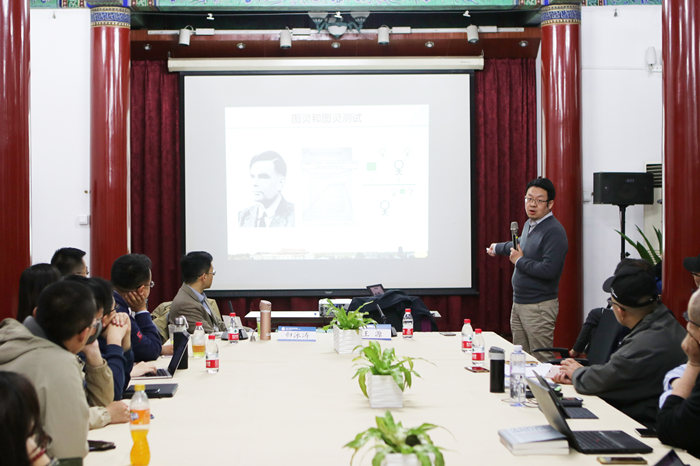
On the evening of April 11, 2019, the Institute of International and Strategic Studies (IISS), Peking University (PKU) held the 33rd seminar of "North Pavilion Seminar" series. Wang Yuan, Deputy Director of the Institute of Microelectronics and Director of the Key Laboratory of Ministry of Education of Microelectronics Devices and Circuits at the School of Electronics Engineering and Computer Science, PKU, gave a seminar entitled "Artificial Intelligence and Brain-like Chips". The seminar was hosted by Gui Yongtao, Vice President of the IISS and Vice President of the School of International Studies (SIS), PKU.
Prof. Wang Yuan introduced the topic by briefing the victory of AlphaGo over a world's top Go player in 2016, and proposed that the year of 2016 is the first year of the explosion of artificial intelligence (AI). By comparing DeepBlue in 1997 and AlphaGo in 2016, he raised a question "whether AI is derived from the improvement of computing power".
Next, Prof. Wang defined "intelligence" and "AI", and introduced the ebb and flow of AI development since the Dartmouth Summer Research Project on Artificial Intelligence in 1956, as well as the three main approaches to AI – symbolism, connectionism and actionism. Combining the current application examples of AI, Prof. Wang analyzed the four main application directions of AI -- computer vision, natural language processing, robotics, and machine learning, as well as the difficulties of these directions. He analyzed in detail the direction of machine learning and introduced three types of machine learning – supervised learning, unsupervised learning, and semi-supervised learning. The current machine learning is still dominated by supervised learning. Prof. Wang pointed out that the winners of the Turing Award in 2018 are the "big three of deep learning". Their winning also confirmed the explosion of AI. The explosion of AI has actually benefited from the emergence of big data and the improvement of computing power.
Prof. Wang believed that the main challenges of AI on hardware (IC chips) are in the following aspects: (1) acceleration of computing power, (2) acceleration of algorithmic capabilities, and (3) acceleration of data storage capabilities. He pointed out some of the current countermeasures to the abovementioned challenges, which include the development from CPU to GPU and the emergence of NPU-specific circuits. Prof. Wang also concluded, that there are three major problems in the realization of strong AI: (1) the power consumption problem, (2) the data handling problem, and (3) the ultimate problem for AI in achieving online self-learning is the emergence of consciousness.
At the end of the seminar, Prof. Wang summarized and compared development plans for AI and brain-like chips of some countries, including the U.S's BRAIN Initiative announced by the Obama administration and the E.U.'s Human Brain Project. He believed that China's development level of AI chips does not lags far behind the international level, but lags behind in the field of integrated circuit processing. Countries keep exploring in the field, but have not yet found an exact and correct development path.
In the final discussion session, Prof. Wang had in-depth exchanges and discussions with teachers and students present at the seminar on issues such as China's development of integrated circuit processing technology and its difficulties, the improvement of accessibility and its bottlenecks, and the theory of quantum brain. (Contributed by Li Jialu)
Editor: Li Fangqi, photography: Zheng Peijie

